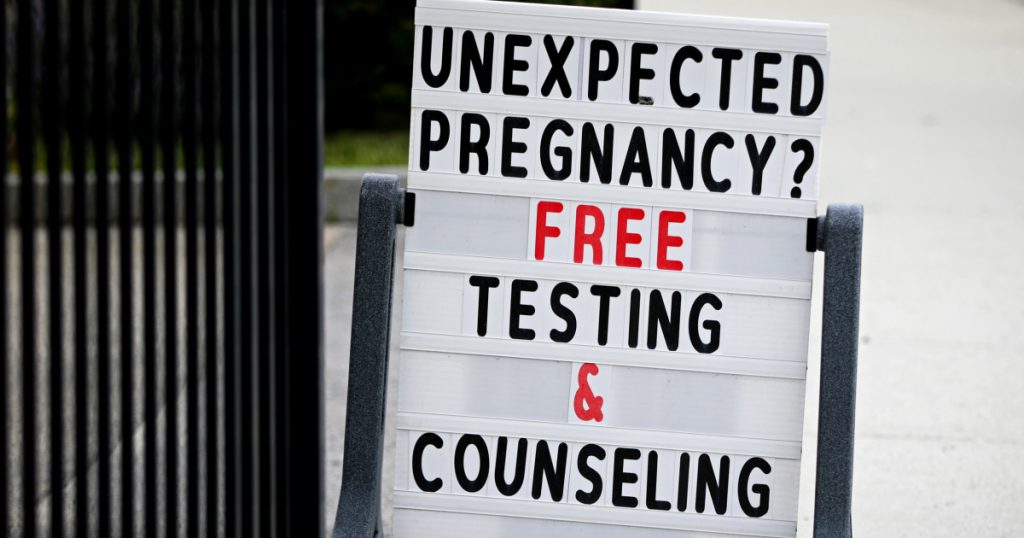Crisis pregnancy center’s forms give rare insight into anti-abortion practices
A free family planning center in Twin Falls, Idaho, asks its visitors for sensitive, private information, including nonmedical questions about religion and financial status, according to documents obtained by NBC News.
While the Sage Women’s Center promises to protect the information of its clients, it isn’t bound by medical privacy laws and may be misleading women who are coping with unplanned pregnancies, consumer advocates say.
Crisis pregnancy centers like Sage offer counseling and other services to pregnant women while trying to persuade them not to have an abortion. The questionnaires, known as client intake forms, give rare insight into the practices of Sage and other crisis pregnancy centers and how they use ambiguous language to describe their services.
The forms were provided to NBC News by the Campaign for Accountability, a progressive watchdog group, after it sent a letter to the Idaho attorney general raising concerns about the center, which advertises itself as a resource for pregnant women.
In April, the group asked attorneys general of five states to investigate crisis pregnancy centers, including Sage Women’s Center, arguing that the organizations are misleading clients with claims that their personal medical data is protected by health privacy laws.
In response to the request, Idaho Attorney General Raúl Labrador provided the group with the intake forms from Sage. A spokesperson for Labrador told NBC News that his office does not comment on investigations. Labrador’s office told Law360 in April that the attorney general was “looking into the matter with our Consumer Protection Division.”
“Sage’s client intake form provides a rare peek behind the curtain into the concerning ways unregulated pregnancy clinics question clients and should be a major red flag for anyone considering walking into one of these centers,” Campaign for Accountability Executive Director Michelle Kuppersmith said in a statement to NBC News. “We hope Sage’s practices are investigated to determine whether they violate Idaho law.”
The questionnaires given to new visitors to Sage ask women to disclose prior pregnancies and whether they were carried to term, miscarried or terminated. The forms also include questions about a patient’s religious beliefs, as well as guidance for the center’s volunteers to share Bible passages.
There are also questions about intentions for the pregnancy, whether the father is aware and “what decision would the father like you to make regarding the outcome of your pregnancy.”
The documents contain a scoring system for the center’s staff and volunteers to assess if the client is “abortion vulnerable.” Women are also asked, “Who would support your decision if you decide to abort your pregnancy?”
In the forms, staff members are asked for specific details on how women behaved during the appointment, such as whether they laughed, cried, smiled or appeared sad, or looked away during an ultrasound. And staff members are prompted to schedule repeat ultrasound appointments at the center if it seems a client may choose abortion.
Sage promises that “Protected Health Information will be kept strictly confidential,” and “all information is kept private except if child abuse or other mandated reporting laws apply or if we believe or hear that you are in danger of hurting yourself or others.”
Some medical experts say the questionnaires go beyond what a typical women’s clinic would need.
“It’s not like any medical intake form I have ever seen,” said Dr. Linda Prine, a family medicine provider and the founder of the Miscarriage and Abortion Hotline. “The notes on the demeanor of the patient are so weird.”
Prine pointed to the forms’ scoring system for “abortion vulnerability” and noted that the query about religion prior to a pregnancy test is highly unusual.
“It’s clearly all about just trying to make sure she doesn’t go for an abortion,” Prine said.
Dr. Jayme Trevino, the Darney-Landy fellow at the American College of Obstetricians and Gynecologists, said it’s not uncommon for hospitals and clinics to ask patients to provide religious affiliation voluntarily during the intake process as a way to identify beliefs or practices that may affect care.
“What is concerning about this form is the level of detail being asked (providing the name of their church) and how the information is used to have a ‘Spiritual Discussion’ with patients,” Trevino said in an email. “There are many sections of this form that perpetuate misinformation and harmful abortion stigma, and use biased, non-medical language about abortion such as so-called ‘post abortion syndrome.’”
Sage Women’s Center says on its website that it complies with the federal Health Insurance Portability and Accountability Act, known as HIPAA, and that the information is protected and kept confidential.
But because the center offers its services for free, it’s not actually legally bound by federal health data privacy laws.
In fact, in its privacy policy, Sage Women’s Center says “any transactions that invoke coverage of the HIPAA Privacy Act” and therefore its privacy practices are “voluntarily undertaken.”
“Disclosure of your [private health information] may be made without your consent or authorization when required by law, when required for public health reasons, when necessary to avert a threat of harm to you or a third person, or when other circumstances may require or reasonably warrant such disclosure.” the privacy policy says.
Given crisis pregnancy centers’ anti-abortion stance, it’s unclear if Sage Women’s Center would consider seeking an abortion as harm to “a third person” or whom or what groups the center might disclose the information to.
Sage Women’s Center did not respond to requests for an interview.
Delaying tactics are typical, experts say
Idaho has some of the strictest anti-abortion laws in the country, with the practice banned in nearly all cases with very limited exceptions, according to the Guttmacher Institute,a research group that supports access to abortion.
These practices are typical for crisis pregnancy centers across the country, according to the American College of Obstetricians and Gynecologists. The tactics used at crisis pregnancy centers often create delays that leave women unable to access abortions, forcing them to continue their pregnancies.
That’s what nearly happened to Willow, a woman in her 20s who asked to be identified only by her first name for safety reasons. NBC News met her recently in the waiting room of the Colorado abortion clinic where she terminated a pregnancy in the second trimester.Initially, it took Willow several weeks to discover she was pregnant.
“I didn’t realize that I was pregnant, because my periods are irregular,” she said.
She says another reason she sought an abortion so far along in her pregnancy is because her care was delayed by a crisis pregnancy center where she sought a free pregnancy test and ultrasound.
“I had really no other option, because if I went anywhere else it would have cost money,” she said.
While she knew she was receiving services from a Christian nonprofit, what she didn’t expect was the length of time it took to get results from the center.
“They made me wait a week to get the first pregnancy test to confirm that I was pregnant, just so I could get an ultrasound,” she said. “I had to then wait two weeks to get an ultrasound.”
That ultrasound revealed Willow was too far along in her pregnancy for some clinics in Colorado to be able to safely treat her (there are no gestational limits on abortion in the state). She was turned away from three clinics before finding an appointment.
“I was devastated and terrified,” she said. “I thought that my life was about to get a whole lot harder, and there was nothing I could do about it.”
Willow says she knew she did not want to be a parent and that she was financially unable to care for a child — but the nonprofit tried to dissuade her from seeking an abortion.
“One of the first things they had asked me is, what do you plan to do from here? And I told them that I plan to terminate this pregnancy,” she said. “They just told me that they advised me against this decision and showed me videos on abortion and how dangerous it was. They tried to scare me away from my decision. They pressured me into keeping it by offering their services and free supplies for raising a child.”
Sage Women’s Center, like many other crisis pregnancy centers across the country, is affiliated with Heartbeat International, a major pregnancy-center network that describes itself as a religious ministry. In return for affiliation fees, pregnancy centers receive training, digital support and digital forms used to collect client information from women who interact with their facilities.
“We believe we are better together, and our center management software reflects that by collecting data, across the pregnancy help movement, on critical metrics to provide powerful, actionable insights at the local level,” Heartbeat International writes on its website.
In response to a list of questions from NBC News on practices at their pregnancy centers, Andrea Trudden, vice president of communications at Heartbeat International, said via email, “While Heartbeat International offers recommendations and sample forms, these centers ultimately decide what works best for their specific communities.”
“Regarding abortion vulnerability, the pregnancy centers are committed to offering nonjudgmental care to women facing challenging decisions. Any tools used, such as scoring systems, help to better understand a client’s circumstances and the level of support she may need,” she said. “Centers are committed to upholding the highest standards of confidentiality and care, and any disclosures are made only under circumstances required by law to ensure the safety and well-being of the client and those around her.”
Susannah Baruch, executive director of the Petrie-Flom Center for Health Law Policy, Biotechnology and Bioethics at Harvard Law School, said: “Many of the crisis pregnancy centers are part of networks, and they’re sharing the information up to the networks, which are there to try to reduce the number of people accessing abortion. We don’t know exactly what they would do with the information.”
In its response to the Idaho attorney general, Sage Women’s Center said “no personally identifiable information” is shared with Heartbeat International.
Most crisis pregnancy centers in the United States are affiliated with either Heartbeat International or Care Net, another anti-abortion network.
Care Net’s “New Client/Patient Intake Conversation Guide” includes a similar methodology for scoring women on their likelihood to have an abortion, as well as religious conversational guides. The guide is available for purchase online.
A note on the question, “What would you like to change about your relationship with God, if you could?” says: “This is a good place to share the gospel, if the client seems open.”
North Carolina state Rep. Julie von Haefen, a Democrat who represents a district near Raleigh, says she’s spent much of her six years in office trying to figure out how crisis pregnancy centers use state-appropriated funds. Like Idaho, North Carolina provides state funding to crisis pregnancy centers.
She said she visited a Care Net-affiliated center in Raleigh and requested to see its patient intake documents. Her request was denied.
“I asked them, can you provide me everything that you give to people who might come in for services? And they said, ‘Well, I don’t know about that,’” von Haefen said. “I’m a sitting state legislator, and we give you state money, so I don’t know why you wouldn’t give it to me. And yet they didn’t.”
Instead, von Haefen says, she was provided with a pamphlet.
Care Net did not respond to a request for comment.
“They didn’t show me any documents other than they did give me a couple of flyers,” she said. “The backside of it did have a lot of misinformation about abortions. Kind of the standard thing that they push about abortions cause cancer, or they can cause infertility.”
Source: https://www.nbcnews.com







More Stories
Wegovy treated a serious form of liver disease in a major clinical trial
Some federal workers focused on ‘black lung’ screenings are reinstated but still face June termination
Bucks star Damian Lillard has a torn Achilles and is in doubt for next season